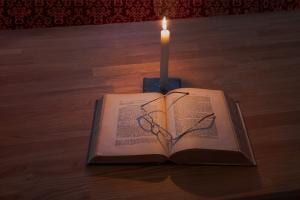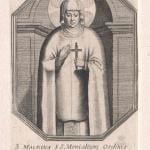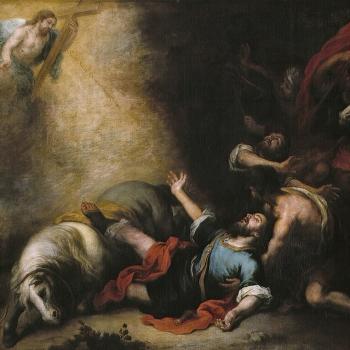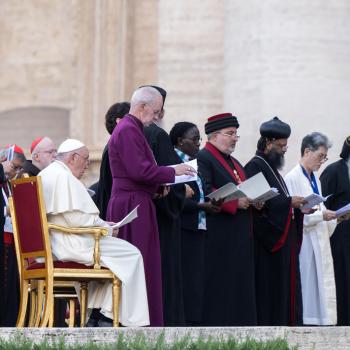
Truth does not contradict truth, so long as the fullness of the truth remains the goal. But if someone tries to pursue an element of the truth and try to separate it from the rest of the truth, then the truth can be abused and lead people astray. For, as Marsilio Ficino warned, “So one who pursues this truth and that truth, separated from the highest truth, without doubt does not light upon truth but upon falsehood.”[1]
We can see how this works in regard moral discussions. Many people take an element of the truth and absolutize it in such a way it no longer remains true. For example, drunk driving is dangerous and often leads to destruction. It would be easy to use this to suggest no one should ever drive drunk. While such a judgment takes from the truth, it ignores many possibilities, many other elements of the truth to make its conclusion. For there are legitimate reasons why someone should be allowed to drive drunk such as if they find themselves in an emergency situation where they have to drive someone to the hospital or else the person would die. Now, someone could use this example to say drunk driving should be allowed, and they would be making the same mistake as those who say no one should be allowed to drink and dive. What is important is the greater truth which recognizes there is more than drunk driving involved in particular contexts in which someone might drive drunk; in many (if not most) of them, drinking and driving should be prohibited due to the dangers involved, but in other situations, there could be good reasons to allow it and so to avoid error, the particular context and what such context reveal are important in determining if and when someone should be allowed to drink and drive. Ignoring the context is like ignoring the fullness of the truth and shows us how and why, if we do so, we can make the wrong judgment call.
This is why, when it is said that truth does not contradict the truth, it is important to realize it is the truths, not the arguments made from particular truths, which do not end in contradiction. Clearly, people often take the same truths and come to rival conclusions about them, just as people can take the same historical facts and come to different readings of history through them. Truth does not contradict the truth, but our reading of the truth is not the truth itself. This is why, when we read Scripture, we must not confuse our interpretation of the text as being the same thing as the text itself. We must not presume the authority of Scripture for ourselves when we discuss our opinions about Scripture and what it means for us today. Scripture is revelation from God which has come to us in and through human instruments; the revelation is true, and indeed, represents the height of wisdom, but the text does not interpret itself. Every reader of Scripture bring their own hermeneutical lens to the text, a lens which then establishes many of their conclusions. If the lens is good, the interpretation can have merit, but if it is faulty, it is likely the interpretation will likely be riddled with errors. Roger Bacon, therefore, told us that if we want to understand Scripture, we must address it through a good philosophical lens: “Hence there is one perfect wisdom which is contained in Scriptures, and was given to saints by God; to be unfolded, however, by philosophy as well as canon law.”[2] For philosophy gives us the tools needed to interpret Scripture; and the better the interpreter, the more they realize how those tools help them to find meaning in Scripture and so realize that other tools can be used to find other, complementary meanings to the text.
Those who take positions of teaching authority in the church should be well-equipped to interpret Scripture by knowing various means of interpreting the text as well as examples from tradition of how Scripture has been interpreted following such means. While we can be holy without education, there are those whose mission in life requires such education if they are to properly fulfill it; for them, education is a must and to ignore it is to ignore their role, and so their holiness is in question. This is why many educated men and women are recognized as saints, not because it is the only way to sainthood, but because knowledge and its proper use can be and is a path of holiness for some. Education is a good, and its value should not be denied. But someone who is educated is not automatically holy: many scholars have ill wills and evil intentions for their knowledge; if they follow such various desires, using their knowledge to support some ill-begotten end, then, despite what they have learned, they are far from holy. It is better not to be educated and be holy than it is to use education for some great evil.
Bede, therefore, warned us that those who are not learned should not take position of teaching authority in the church, for they will use what they do know, their own thoughts and desires, to interpret Scripture and lead people away. At best, they might promote some truth while failing to uphold its fullness, and so would be like King Saul, who at times could be seen to be among the prophets, and yet in his fullness, departed from the truth of God:
But also, when you see those who are unlearned in the Church assume the seat of teaching for themselves and when you see perverse men, under the mask of faithful teachers, imposing upon the listeners whom they have duped, not God’s commandments, but their own traditions which must be kept, their own teachings which must be followed, say: What! Is Saul too among the prophets? [3]
If one is to be a teacher, if one is to explore theological truths and explain them to others, one must have the background to do so. If one is going to interpret Scripture, one should have studied a wide variety of interpretations and methods of interpretation in order to know the various ways one can engage Scripture, but also, to know the limitations involved in such interpretation. Since people ask questions, having those who are educated and capable of giving some answer to those questions is important, but it is a calling for some, not all; other walks of life, other ways of holiness are available and should be recognized and treated as such, especially as many who follow those other paths are holier than those who follow the path of knowledge. But if one wants to act as if one has the knowledge, one must have it, either through direct spiritual experience, through education, or, hopefully, both; otherwise, one pretends to be something which they are not means that they are a fraud whose opinions should be held in doubt.
[1] Marsilio Ficino, The Letters of Marsilio Ficino. Volume 4 (Liber I). trans. by members of the Language Department of the School of Economic Science, London (London: Shepheard-Walwyn, 1988), 23 [Letter 15: To Angelo Manetti].
[2] Roger Bacon, Opus Majus. Part I. trans. Robert Belle Burke (Philadelphia: University of Pennsylvania Press, 1928),65.
[3] Bede, On First Samuel. Trans. Scott DeGregorio and Rosalind Love (Liverpool: University of Liverpool Press, 2019), 425.
Stay in touch! Like A Little Bit of Nothing on Facebook.
If you liked what you read, please consider sharing it with your friends and family!











